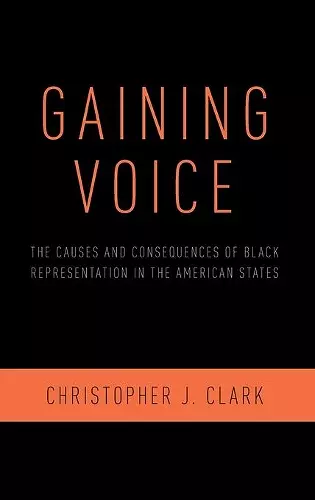Gaining Voice
The Causes and Consequences of Black Representation in the American States
Format:Hardback
Publisher:Oxford University Press Inc
Published:11th Apr '19
Currently unavailable, and unfortunately no date known when it will be back

Scholars studying the causes and consequences of political representation, particularly in terms of gender and race, often turn to a concept called descriptive representation. Descriptive representation tells us the degree to which elected officials resemble their constituents, and whether such a resemblance has a bearing on the way they legislate. In other words, do people vote for candidates of their same racial/ethnic background or gender? If they do, does this affect the type of policies an elected official pursues? Further, if citizens see people who look like them in office, does it have an effect on their political attitudes and participation? In this book, Christopher J. Clark argues that descriptive representation is a more multi-faceted phenomenon than previously shown, particularly when observed at the state level. He contends that black political involvement, political attitudes, and public opinion are contingent on more than being represented by a single black elected official. Rather, they hinge on the proportion of African Americans making up a state legislature--what Clark terms "black seat share"--as well as the degree to which that proportion reflects the demographic makeup of the state. As well, Clark pinpoints the critical mass of African American legislators necessary to initiate the creation of black caucuses, an important institution for minority representation. Clark bases his study on an examination of black representation in state legislatures between 1966 and 2010, looking particularly at black political opinion and involvement in the development of welfare and education policy.
Clark has provided a quite noteworthy contribution to our empirical understanding of how — and in what context — descriptive representation matters in affecting policy and political outcomes. I commend him for providing extensive evidence... * Todd C. Shaw, University of South Carolina, Perspectives on Politics *
Ultimately Clark's book represents a valuable contribution to a number of sub-fields in the study of American politics. * Michael P. Olson, Harvard University, Journal of Race Ethnicity and Politics *
Christopher Clark's book, Gaining Voice, is a welcome addition to the literature on race and representation. It deftly argues for a multifaceted approach that examines individual and collective representation through caucuses at the state level. Scholars interested in legislative politics, state politics, and race in American politics should read this book, and take seriously the call to examine representation in this way as it will yield new knowledge and research paths for future work. * Jason P. Casellas, Associate Professor of Political Science, University of Houston *
Gaining Voice traces the representation of African-Americans in state legislatures from its demographic causes to the way it shapes legislative institutions and finally through to its powerful policy consequences. Clark draws on a range of sources to show where black politicians win office and just how strong their voices can be on issues such as education spending. * Thad Kousser, Professor and Department Chair of Political Science, UC San Diego *
- Winner of Co-Winner, Virginia Gray Best Book Award, APSA State Politics and Policy Section Winner, Alan Rosenthal Prize from the Legislative Studies Section, American Political Science Association.
ISBN: 9780190933562
Dimensions: 155mm x 236mm x 15mm
Weight: 612g
264 pages